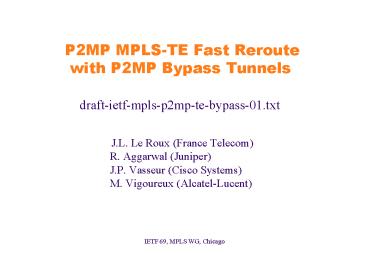P2MP MPLSTE Fast Reroute with P2MP Bypass Tunnels draftietfmplsp2mptebypass01'txt - PowerPoint PPT Presentation
Title:
P2MP MPLSTE Fast Reroute with P2MP Bypass Tunnels draftietfmplsp2mptebypass01'txt
Description:
Limitations of P2P bypass tunnels to protect a P2MP LSP = Traffic ... P2MP Bypass tunnel Label ... No PHP on the bypass tunnel to allow for context ... – PowerPoint PPT presentation
Number of Views:75
Avg rating:3.0/5.0
Title: P2MP MPLSTE Fast Reroute with P2MP Bypass Tunnels draftietfmplsp2mptebypass01'txt
1
P2MP MPLS-TE Fast Reroute
with P2MP Bypass Tunnels
draft-ietf-mpls-p2mp-te-bypa
ss-01.txt
J.L.
Le Roux (France Telecom)
R. Aggarwal (Juniper)
J.P. Vasseur (Cisco
Systems)
M. Vigoureux (Alcatel-Lucent)
2
Document Overview
- Limitations of P2P bypass tunnels to protect a
P2MP LSP gt Traffic duplication - To overcome these limitations this draft defines
extensions to the FRR procedures to support P2MP
Bypass tunnels - Retain scalability advantages of MPLS label
stacking - Avoids sending multiple copies of a packet on
some links during failure - During failure the traffic is tunneled within one
or more P2MP bypass towards the set of Merge
Points thanks to label stacking - Inner label backup LSP Label, used on the MP to
forward traffic to the protected LSP - Outer label P2MP Bypass tunnel Label
- To avoid data replication on the PLR, a same
inner label is assigned by the PLR to all MPs on
a given P2MP bypass - following RSVP-TE Upstream Label Assignment
procedure - draft-ietf-mpls-rsvp-upstream
3
Changes since last version
- Draft adopted as WG document in May
- No PHP on the bypass tunnel to allow for context
identification - Bypass signaled with the No-PHP desired bit, as
specified in
draft-ali-mpls-rsvp-te-no-php-oob-mapping - Reversion Entirely rely on procedures defined in
RFC4090 - global and local revertive modes
- Clarifications on PLR location local or remote
- Combination of P2P and P2MP Bypass tunnels for
backward comp - Bypass tunnel selection options clarified
- Link protection procedures clarified
- Procedures for Partial protection
- Some rewordings for the sake of clarity
4
Combination of P2P and P2MP Bypass
No Up Label capable
P2P Bypass
- P2MP bypass and P2P bypass can be used in
conjunction - For MP on P2P bypass gt follow procedures in 4875
- For MP on P2MP Bypass gt follow procedures in
this doc - No upstream label assignment for MP leaves of P2P
bypass - Allows for backward compatibility with MP that do
not support upstream label assignment
P2MP Bypass
5
P2MP Bypass Tunnel selection options
- Various options to protect a P2MP LSP with P2MP
bypass - 1 A single P2MP Bypass tunnel whose leaves
exactly match the set of MPs - 2 A single P2MP Bypass tunnel whose leaves are a
superset of the set of MPs - Leaves that are not MP drop the traffic
- 3 Several P2MP bypass tunnels whose combined
leaves cover all MPs - These options differ in terms of bandwidth
consumption and number of P2MP bypass to be
maintained - P2MP Hierarchy gt Tension between control plane
and data plane optimization - The choice depends on the desired state/bandwidth
tradeoff, and the operational complexity
6
Link protection with P2P Bypass
- Default procedure (defined in RFC4875)
- May lead to traffic duplication on some links
during failure - When the bypass follows another downstream link
on the P2MP LSP
Protected P2MP TE-LSP
P2P Bypass tunnel
Duplication
7
Link Protection with P2MP Bypass
No Duplication
Protected P2MP TE-LSP
P2MP Bypass tunnel
- OPTIONAL procedure A link MAY be protected by A
P2MP bypass
that tunnels traffic towards MPs downstream to
the PLR - Some MPs are downstream to the PLR but not
downstream to the failed element (not impacted by
the failure) - The PLR must stop sending traffic to these MP
within the protected P2MP LSP - Allows avoiding sending twice the traffic on a
downstream link
8
P2MP Partial Protection
Uncovered MP
P2MP Primary Partial prot allowed
- In some cases the PLR may not be able to find a
set of P2P and/or P2MP Bypass Tunnels that cover
all merge points - "P2MP Partial Protection" Only a subset of MP
are covered - upon failure, traffic will not be delivered to
all leaf LSRs - Default PLR behavior Full protection if feasible
else no protection - The Ingress LSR may request for "P2MP Partial
Protection", such that if a P2MP LSP cannot be
fully protected it is partially protected
P2MP Bypass
9
Next Steps
- Need to align with the mpls-upstream draft gt The
PLR assigns upstream labels from a single label
space - WG feedback required
- A new revision to be submitted before Vancouver
meeting - figures, examples, clarifications
10
ThanksQuestions?
11
Appendix
12
Limitations of the P2P Bypass approachnode
protection
- Using P2P bypass tunnels for P2MP LSP node
protection leads to traffic duplication on some
links during failure
Protected P2MP TE-LSP
P2P Bypass tunnel
Duplication
13
Link protection with P2P Bypass
- Default procedure (defined in RFC4875)
- May lead to traffic duplication on some links
during failure - When the bypass follows another downstream link
on the P2MP LSP
Protected P2MP TE-LSP
P2P Bypass tunnel
Duplication
14
Protection with P2MP Bypass
Protected P2MP TE-LSP
P2MP Bypass tunnel
P2MP tunnel B
P2MP tunnel P
P2MP tunnel B ILM (label 21) 50 -gt 28, R6
P2MP tunnel B ILM (label 23) 50 -gt 37, R7
15
P2MP Bypass Tunnel SelectionOption 1
Protected P2MP TE-LSP
P2MP Bypass tunnel
16
P2MP Bypass Tunnel SelectionOption 2
Protected P2MP TE-LSP
P2MP Bypass tunnel
drop
17
P2MP Bypass Tunnel SelectionOption 3
Protected P2MP TE-LSP
P2MP Bypass tunnel































